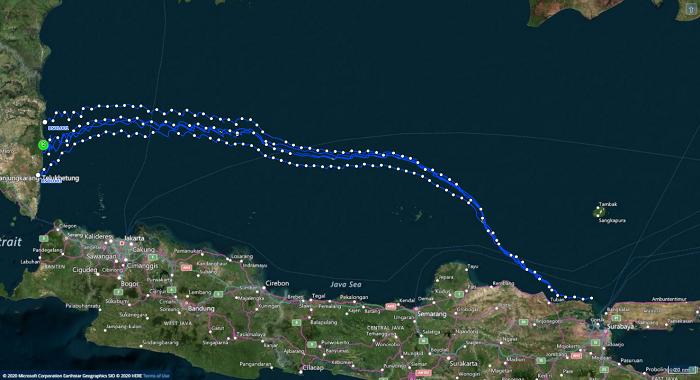European Sustainable Development Weeks: Indonesia calls on European expertise in space to optimize marine waste collection
- September 23, 2020
- Category: Flash info
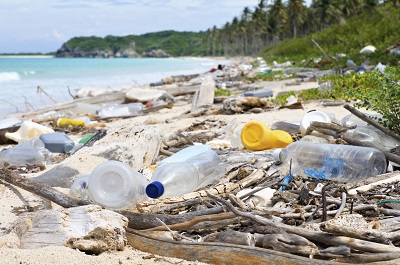
Indonesia is among the biggest contributors to marine plastic pollution. In response to this emergency, the Indonesian government is engaging a range of actions to tackle a scourge that has disastrous consequences for the environment, public health and the economy. Its national marine pollution plan aims to reduce plastic waste by 70% between now and 2025.
To this end, the Ministry of Marine Affairs and Fisheries (in Indonesian, KKP) has turned to CLS, a subsidiary of CNES* and CNP**, and to the IRD development research institute to get a clearer picture of where this waste is going in Indonesia’s maritime territories.
The programme is being supported by the French development agency AFD and the World Bank. Its objective is to gain new insight into how marine plastic and other waste from rivers and large cities drifts, accumulates and is washed ashore in order to prioritize and optimize collection at sea and on land.
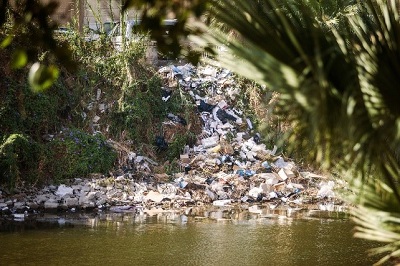 Why model drift of marine plastic pollution from rivers?
Why model drift of marine plastic pollution from rivers?
KKP’s Research and Development Agency began work this year in partnership with CLS and IRD, and in close collaboration with LIPI, the Indonesian Institute of Sciences, on studies of the circulation of plastics in rivers, streams and the ocean funded by the French development agency AFD, and on a broad joint programme to reduce plastic waste with funding from the World Bank.
Indonesia’s researchers are working in concert with French teams to predict where waste is likely to come ashore along its coastlines and establish the role in this process of the most heavily polluted rivers. Understanding the impact of ocean currents and surface winds that carry plastic waste from river mouths to the sea and coasts is important to be able to optimize their collection.
Understanding the mechanisms at play is crucial to inform decisions about human and material resources for collection in the field.
Aryo Hanggono, Director General of Marine Spatial Management at KKP, says: “Indonesia is fully committed to reducing its marine plastic waste by 70% between now and 2025, and KKP will be playing its full part in supporting that effort. CLS and IRD are longstanding partners. We have previously worked together in the fields of sustainable management of marine resources, marine protected areas and aquaculture. Indonesian and European research scientists are today working hand in hand to resolve the problem of marine waste polluting our mangroves, soiling our beaches and causing health complications. We are confident this project, through the precise data and simulations it is providing, complemented by other ongoing actions, will enable us to achieve our objectives by 2025.”
Modelling tools and techniques
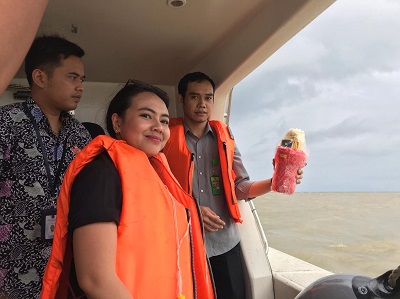 KKP and CLS teams are pursuing two complementary approaches, one on the ground and one based on modelling.
KKP and CLS teams are pursuing two complementary approaches, one on the ground and one based on modelling.
The field approach consists in deploying 70 Argos transmitters from the mouths of the Cisadane in Jakarta, the Bengawan Solo (central Java) and the Musi in Palembang (Sumatra). The transmitters’ positions are tracked by satellite every hour to precisely monitor their paths, allowing research scientists to see where they are coming ashore or accumulating.
At the same time, CLS teams are applying a proven drift model to generate simulations.
CLS Indonesia CEO, Jean-Baptiste Voisin, explains : “CLS is very attached to Indonesia. When you consider this country’s rich biodiversity and natural resources, it’s not hard to understand why we feel such a strong bond with the place. It’s a rich and fragile archipelago that needs to be preserved, and our projects—like this one—are making a big contribution. This proven tool allows us to study the drift of macro-waste from the mouths of the rivers. The combination of modelling, simulation tools and in-situ data from our Argos transmitters is CLS’s great strength. Our drift models are proven for monitoring biodiversity, predicting the arrival of sargassum seaweed on beaches in the Caribbean, tracking icebergs that are a threat to competitors in ocean yacht races and coastal pollution as seen recently with the oil spill from the Grande America, or for supporting emergency responders when tracking ships adrift at sea. CLS has acquired absolutely unique experience and expertise in monitoring and protecting the world’s oceans.”
This system and this first programme are complemented by several dedicated studies being pursued by IRD’s teams, for example to provide high-resolution models of river mouths used to gain a better understanding of local effects, where ocean models begin to show their limitations.
Edmond Dounias, Représentant de l’IRD en Indonésie, adds: “IRD’s oceanography experts are working to establish high-resolution models of ocean dynamics for Indonesia’s seas. Their efforts are contributing significantly to a more in-depth understanding of plastic flows at regional and global scales and thus enabling more effective use by KKP of CLS’s drift simulation tool. The decades of research and development work conducted in oceanography and environmental science are sure to be a precious aid in accomplishing this project. The signature of a cooperation agreement with KKP covering a broad range of areas also points to this project being the start of a great new adventure to help Indonesia exploit and preserve its marine ecosystem for the long-term benefit of its citizens.”
Discoveries
Initial results suggest that 90% of plastic waste is being washed ashore. This is good news, as it is obviously easier, cheaper and safer to collect it on land than at sea.
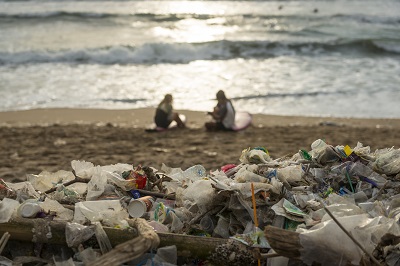 International cooperation and prospects for the future
International cooperation and prospects for the future
The teams at KKP and CLS are now poised to launch a plastic drift simulation portal for research scientists to help them to simulate and understand the periods and processes involved when plastic accumulates or is washed ashore, as well as to establish fundamental relationships with biodiversity habitats.
This portal will be a key tool for predicting volumes of waste likely to wash ashore and, more important still, identifying accumulation and dispersion points in rivers. Such information will be of strategic benefit to prevent future marine pollution.
How these ‘waves’ of plastic actually migrate obviously depends on the season. Initial observational studies covering the first six months of 2020 will be stepped up with the deployment of several tens of additional transmitters during the second half of the year.
This programme was made possible by funding from the World Bank and the French development agency AFD. Emmanuel Baudran, AFD’s Director in Indonesia, comments: “Our mission is to fund, support and accelerate transitions toward a fairer and more sustainable world. Our people are working on thousands of projects in more than a hundred countries in the fields of climate science, biodiversity, peacekeeping, education, urban planning, healthcare and governance to name just a few. Given the importance of the maritime sector to social and economic development, sustainable development of the oceans and the maritime domain is one of AFD’s priorities in Indonesia, with €400 million invested in 10 years. This project is a major challenge that we are working on alongside CLS and IRD to achieve the Sustainable Development Goals (SDGs) set by the United Nations. It is also supporting the nation’s blue economy, which derives most of its resources from the sustainable exploitation of the marine and coastal heritage—a strategic heritage to be preserved. This project is clearly contributing to that aim. We are very proud to keep supporting KKP on their essential projects.
Congratulations to CLS and IRD for this scientific and technical collaboration.”
Andre de Aquino, Senior Natural Resources Specialist at the World Bank, adds: “The World Bank works in every major area of development around the world. We provide a wide array of financial products, technical assistance and analytical work. We are committed to tackling poverty, increasing prosperity for all and promoting sustainable development. Oceans are very strategic to many countries’ development and are greatly threatened by marine plastic pollution. Supporting countries address the marine plastic scourge has become a strategic domain for the World Bank. We have been working closely with Indonesia’s government to support their ambitious National Action Plan to Curb Marine Debris. We are happy to support KKP and LIPI to increase understanding the mechanisms of pollution so they can rationalize and optimize their clean-up actions, which we are expecting to support through the Oceans for Prosperity project under preparation. This is an important step in supporting Indonesia transition to a blue economy.”
Kementerian Kelautan dan Perikanan (KKP)
The vision of the Indonesian Ministry of Marine Affairs and Fisheries (in Indonesian, Kemeterian Kelautan dan Perikanan or KKP) is to create an independent, advanced and strong maritime and fisheries sector focused on the nation’s interests.
The ministry oversees the management of marine resources and fish stocks, develops and maintains quality control and safety of fisheries products, optimizes management of maritime zones, preserves marine biodiversity, sustains the fishing and fish farming industries, and develops human resources capabilities and science and innovation in the marine and fisheries sectors.
Sustainable management of its marine and fisheries resources is key to Indonesia’s future and one of KKP’s priority missions, of which protecting the marine environment and eradicating marine plastic pollution are a vital element.
Collecte Localisation Satellites (CLS)
CLS is a global company and pioneering provider of solutions for surveying and monitoring the Earth since 1986. We are a subsidiary of the French space agency CNES and CNP. Our mission is to create innovative space-based solutions to understand and protect our planet and to manage its resources sustainably. CLS employs 750 people at our headquarters in Toulouse, France, and at 25 other sites around the world. We operate in five strategic markets: sustainable fisheries management, environmental monitoring, maritime surveillance, fleet management and energy and mining. We provide satellite-based location and environmental data collection services, processing data from 100,000 transponders per month on drifting buoys, animal tags, fishing vessels (VMS) and merchant ships (LRIT), and observe the oceans and inland waters with more than 20 instruments on board satellites delivering daily information on the world’s seas and oceans. We also monitor land and sea activities by satellite, with more than 10,000 radar images processed and several hundred drone flight hours analysed by our teams every year. The CLS Group generated revenues of nearly €135 million in 2019. Committed to a sustainable planet, we are working every day for Earth, from Space.
L’Institut de Recherche pour le Développement (IRD)
IRD is a French public research establishment operating under the joint authority of the French Ministry for Higher Education, Research and Innovation and the French Ministry for Europe and Foreign Affairs. It takes an original approach to research, expertise, training and knowledge-sharing for the benefit of countries and regions, making science and innovation key drivers in their development.
L’Agence Française de Développement (ARD)
The Agence Française de Développement (AFD) is a public establishment in charge of executing France’s development and international solidarity policy. Focusing on climate, biodiversity, peace, education, urban development, health and governance, our teams are working on more than 4,000 projects in France’s overseas departments and territories and another 115 countries. In this way, we are contributing to the commitment of France and its citizens to achieving the UN Sustainable Development Goals (SDGs).
La Banque Mondiale
AWith 189 member countries, staff from more than 170 countries and offices in over 130 locations, the World Bank Group encompasses five institutions working together for sustainable solutions that reduce poverty and build shared prosperity. The World Bank Group is one of the main sources of funding for developing countries. Its missions are to put an end to extreme poverty and promote shared prosperity. The World Bank Group is one of the main sources of funding and know-how for developing countries. It is composed of five institutions working to reduce poverty, share prosperity more widely and promote sustainable development.
Le CNES*
CNES (Centre National d’Etudes Spatiales) is the government agency responsible for shaping France’s space policy and implementing it in Europe. Its task is to conceive and orbit satellites, invent the space systems of the future and nurture new services to aid us in our daily lives. Founded in 1961, it is the initiator of major space projects, launch vehicles and satellites, and the partner of choice for industry fuelling innovation. CNES comprises some 2,500 men and women with a passion for space working to open up new and infinite fields of applications in five core areas of focus: Ariane, science, Earth observation, telecommunications and defence. It is a key player driving technology innovation, economic development and industrial policy for the nation. It also fosters scientific collaborations and has forged numerous international partnerships. France, represented by CNES, is the leading contributor to the European Space Agency (ESA).
La CNP**
CNP is an investment firm founded by Albert Frère and exclusively managed by the Frère family. CNP invests its permanent capital for control or joint control of European industry leaders and is an active partner driving sustainable value creation alongside the founders, management and families it associates with. Together with GBL, CNP is one of the two pillars of Groupe Frère that manages net assets of approximately €5.5 billion.

